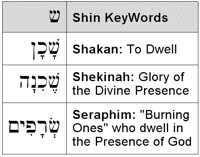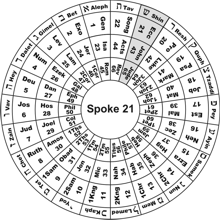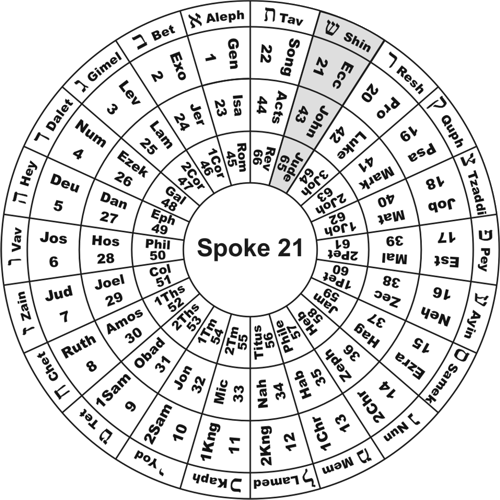Jesus Christ: The Light of the Word
In the beginning was the Word, and the Word was with God, and the Word was God.
The same was in the beginning with God. All things were made by him; and without him was not any thing made that
was made. In him was life; and the life was the light of men. And the light shineth in darkness;
and the darkness comprehended it not. There was a man sent from God, whose name was John.
The same came for a witness, to bear witness of the Light, that all men through him might believe.
He was not that Light, but was sent to bear witness of that Light. That was the true Light,
which lighteth every man that cometh into the world.
John 1:1ff (Spoke 21, Cycle 2)
 One
of the great glories of the Christian Faith is that it grounds reality in meaning.
Creation originates in the
Word of God, and the essence of a word is meaning. We heard this message in the beginning when God said
"Let there be light" (Gen 1:3), and as we watch the revelation unfold through the sixty-six books,
we discover that God's Creative Word is alive, and personal, and that He is the root source of all
Love, Life, Light, and Truth. This is the message of John's Gospel.
It reveals that life is, by definition, utterly meaningless without Christ because He Himself is the
Logos, the Word of God, the root source of all meaning. One
of the great glories of the Christian Faith is that it grounds reality in meaning.
Creation originates in the
Word of God, and the essence of a word is meaning. We heard this message in the beginning when God said
"Let there be light" (Gen 1:3), and as we watch the revelation unfold through the sixty-six books,
we discover that God's Creative Word is alive, and personal, and that He is the root source of all
Love, Life, Light, and Truth. This is the message of John's Gospel.
It reveals that life is, by definition, utterly meaningless without Christ because He Himself is the
Logos, the Word of God, the root source of all meaning.
Immediately after revealing the Divinity of the Word, the Second Person of the Trinity,
John declared the fulfillment the whole typological pattern established in the Tabernacle that housed the
Word (Spoke 2, BW book pg 136) and that was filled with the glory of the Divine Presence
of the Holy Spirit (Spoke 3, BW book pg 155):
And the Word was made flesh, and dwelt among us,
(and we beheld his glory, the glory
as of the only begotten of the Father,) full of grace and truth.
John 1:14 (Spoke 21, Cycle 2)
God designed this verse so that readers familiar with both Greek and Hebrew,
like many in the first century, could not help but see its relation to the typology of the Tabernacle.
The Greek verb translated as "dwelt" – eskénosen – literally means "tabernacled." It is from skené
(tabernacle) which corresponds directly to the Hebrew mishkan (tabernacle) which itself is formed from
the Shin KeyWord shakan (to dwell). And from this the Jews derived the word Shekinah to
denote the glory of the Divine Presence that filled the Tabernacle. These words are all closely related in
both meaning and sound since they share the same set of consonants in the same order. The implications are
as obvious as they are inevitable. Here is how
Arthur W. Pink  explained it: explained it:
The language of this verse takes us back in thought to the Tabernacle which was pitched
in the wilderness, of old. The Tabernacle was the place of Jehovah's abode in the midst of Israel.
It was here that He made His dwelling-place. The Tabernacle was where God met with His people,
hence was it termed "the Tent of Meeting." There,
within the Holy of Holies was the Shekinah Glory manifested.
The Lord Jesus Christ was the Anti-type. He was, in His own person, the Meeting-place between God and men.
And just as the Shekinah — the visible and glorious manifestation of Jehovah — was seen in
the Holy of Holies, so those who came near to Christ, in faith, "beheld His glory."
The Lord Jesus was God manifest in the flesh, displaying "the glory as of the Only Begotten of the Father."
Fire (esh) and the KeyWord shakan are closely associated with God's glory.
All three appear together in His earthshaking appearance upon Mount Sinai:
And the glory of the LORD abode (shakan) upon mount Sinai, and the cloud covered
it six days: and the seventh day he called unto Moses out of the midst of the cloud.
And the sight of the glory of the LORD was like devouring fire (esh) on the top
of the mount in the eyes of the children of Israel.
Exodus 24:16f
These are a few of the ideas God intended us to connect when we read John 1:14.
As a final note, the angelic beings who dwell in the presence of God are called Seraphim, which
literally means "the burning ones." These are they who cease not to declare " Holy, holy, holy, is the
LORD of hosts: the whole earth is full of his glory" (Isa 6:3).
|



